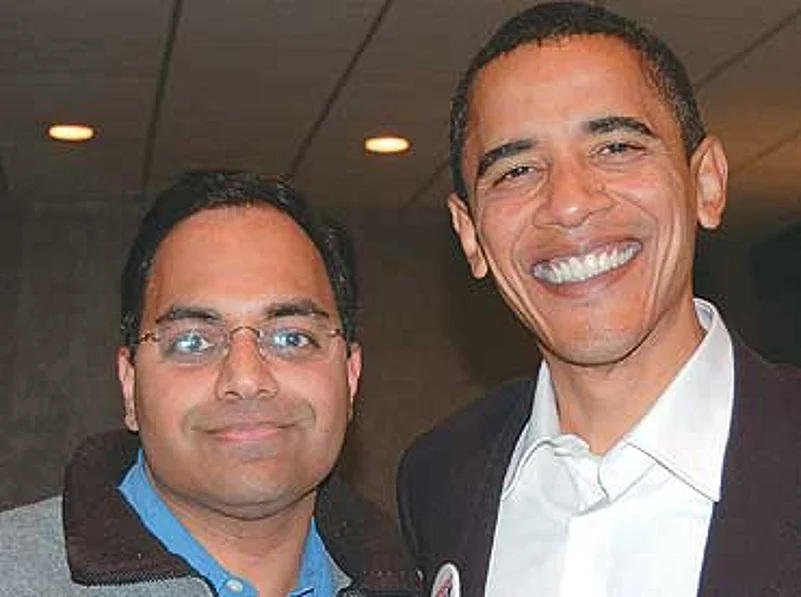- Neera Tanden was in Hillary's team, now Obama's domestic policy director
- Preeta Bansal was with Obama from the very start, is a senior policy advisor
- Hari Sevugan is a top staffer in the communications department
- Madhuri Kommareddi is Obama's deputy policy director
- The Asian-American Finance Committee's co-chair is held by several Indians, including Vinod Khosla and Swadesh Chatterjee
***
- Has set up an Indian policy team comprising seasoned South Asian hands like Karl Inderfurth and Bruce Riedel
- Takes care to mention India in his speeches. Has described India as the US's natural 21st-century strategic partner.
- Has issued a policy paper that speaks of his working for the Indian-American community. Outlook's last week's interview has bolstered this impression.
***
"As the child of a black man and a white woman, someone who was born in the racial melting pot of Hawaii, with a sister who's half Indonesian but who's usually mistaken for Mexican or Puerto Rican, and a brother-in-law and niece of Chinese descent...I've never had the option of restricting my loyalties on the basis of race, or measuring my worth on the basis of tribe. Moreover, I believe that part of America's genius has always been its ability to absorb newcomers, to forge a national identity out of the disparate lot...."
—Barack Obama in his book, The Audacity of Hope

Similarly, the campaign's Asian-American Finance Committee comprises many South Asian Americans tasked with raising funds to elect Obama president. The committee's national co-chair Vinod Khosla, a Silicon Valley venture capitalist, explains his support for Obama. "He cares about the environment, which is my No. 1 issue. He wants to get out of Iraq, which to me means less fiscal expense, and he will also do much better at international relations." Besides Vinod, the committee leadership includes national co-chairs Sohaib Abbasi, Nasser Ahmad, Romita Shetty, Cyrus Amir-Mokri, Swadesh Chatterjee and Mahinder Tak. At the grassroots level, the co-chairs include Hrishi Karthikeyan, Dave Kumar and Reshma Saujani.
Prior to working for Obama, Reshma was a "fierce and loyal supporter" of Hillary, admiring her for all that she has done for women and children worldwide. "So until Hillary endorsed Senator Obama, this election for me was deeply personal because I had the opportunity to work on a presidential campaign of someone I knew and trusted. And I deeply believed that electing a woman president would have been a historic achievement for this nation," Reshma explains. But the lure of Obama is no less compelling now. For Reshma, Obama's journey to the White House is reminiscent "of our own struggle, as second-generation South Asian Americans, and all of us should be forever indebted to both Barack and Hillary for the barriers they have shattered on behalf of all of us."
Perhaps Hillary's supporters would have kept away from the Obama campaign had it not been for what they perceive as Bush's "disastrous" administration. As Swadesh Chatterjee says, "The last eight years have been a disaster. We need a breath of fresh air and Obama has the ability to make it happen." A first-generation Indian American, Swadesh says many like him will now back Obama. But this support for Obama isn't only because of the "push" factor of Bush. Preeta, for one, credits this support to Obama "actively inviting the energy" of the Indians here. "The first generation is coming on board," she says. "There is a combining of forces of second and first generations."
India is important to Obama, quite obvious from his exclusive interview with Outlook last week. No wonder the campaign has an India policy team, comprising seasoned South Asia hands including Karl Inderfurth, a former assistant secretary of state for South Asian affairs in Bill Clinton's administration, and Bruce Riedel, a senior advisor to three US presidents on Middle East and South Asian issues. Riedel has helped shape Obama's speeches and interviews in which he has discussed in detail the need for a new Pakistan policy that supports democracy. "He also calls (in a July 1 speech) for stronger relations with the world's largest democracy, India, as he did in the Outlook interview ," Riedel points out.
The campaign put out a policy paper, Barack Obama: Working For the Indian American Community, which says at the outset that as a community organiser, civil rights lawyer, and elected official, Obama has spent his career working on issues of importance to Indian Americans. It says Obama looks forward to strengthening his relationship with Indian Americans during his presidential administration. On foreign policy, the paper says, "Obama believes that India is a natural strategic partner for America in the 21st century."
US-India relations are not necessarily a top priority for most second-generation Indian Americans. "I am concerned about our relationship with every country in the world, and India is an important ally," says Hrishi, a co-founder of the grassroots group South Asians for Obama (SAFO), admitting he is more focused on domestic issues such as healthcare. "Among issues important to an Indian American," Dave Kumar, who co-founded SAFO, says, "there is a greater appreciation for civil rights issues, the issue of diversity that we are all Americans and have a role to play in building society." Obama not only addresses all these issues, but also has "more of a natural connection with the second generation", he adds. Jay Chaudhri, president of the Indian American Leadership Initiative, agrees, saying this is because the second-generation Indians can identify with Obama's story and because he is 46 years old. "We have friends in that age group, and Obama has strong friendships with Indian Americans of the same age group," says Jay, pointing to Obama's South Asian college roommates to bolster his argument.
Obama's lure also lies in drawing the young into politics, particularly those among the immigrants who felt alienated. Says Reshma, who grew up in Illinois admiring Obama, "To me Barack is a vessel for a movement of young people that so desperately needed to be engaged in strengthening our nation. I have always been and continue to be in awe of how his campaign embraced young voters fully and created a surge in their participation that will have a lasting impact on the Democratic Party."
Obama, in many ways, encapsulates the story of the individual immigrant. As Subodh says, "His story is essentially my story. It was a story about the sacrifices the parents make, the opportunities that they have and is a story about perseverance and trying to find one's own identity in the American mosaic. Reading his autobiography felt in many ways like reading the autobiography I haven't written." Adds Kansas State representative Raj Goyle: "Obama understands that the community has contributed significantly to the growth of the US. There are good reasons that he has the support of the community—he works across party lines; he values hard work."
As the campaign for presidential election gathers momentum, the Obama lure is likely to become irresistibly seductive for Indians. Subodh feels Obama in the White House will demonstrate to the world that only in America can a person with his background rise to the highest office in the world. Perhaps the second-generation Indian community could take cue from Obama and fashion new dreams and ambitions.

























